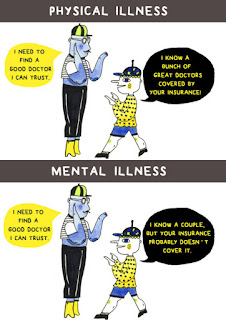Mental Health Data Missing from Electronic Health Records
Despite federal desires (CMS & HHS )to totally wrap medical records into an electronic format there remain several critical issues important to guarding privacy of patient mental health information. The Federal Definition of an EHR is extends beyond the aspects of recording patient data. They define an EHR with a broad pen including capabilities of meaningful use capturing data for analytic purposes.
By convention, and a long ethical history, providers have always guarded the privacy and protection of patient’s medical records, especially for emotional disorders. The physician has always been the health information collection agent in a fiduciary manner. If the emotional and behavioral aspects were put into the EHR it would greatly endanger patient’s reputations, employment, and even discrimination by health plans. The Affordable Care Act has markedly reduced the risk of non insurability by law. The other issues have not been addressed.
There is a spectrum of behavioral disorders ranging from severe organic brain disease resulting in schizophrenia and bipolar disorders to mild neurosis and anxiety disorders. It is a gray playing field and somewhere in the middle it crosses over from ‘medical disorder’ to ‘behavioral disorder" in the reimbursement system. (What's in an ICD code?)
Health Plans discriminate between the two on a reimbursement basis as well. Co-pay for visits to a psychologist are higher than medical visits. In some cases even when an MD psychiatrist is involved the visiit is not treated as a medical visit even if medications are managed by the psychiatrists.
Often the staff at a ‘behavioral clinic’ do not discern the difference and bill improperly.
The federal government is interested in interoperability for purposes of data analytics. The experts who advise congress and HHS are misguided and naive, positing that developing this system will improve the quality of health care.
Mental health issues should have a higher level of privacy protection. Not every provider should have access to the mental health record of every patient. That is a shot gun approach prone to much collateral damage. Mental health records should only be in the EHR in a higher level of protection with additional access granted only by the patient. The level of emotional dysfunction will be a major determinant in the importance of the information.
In a time when medical care has become patient centered the patient will have the final word on release of potentially harmful behavioral information. It is now established that the patient owns his own data even while it resides in the EHR program. He owns it and no one can take it without the patient's permission. (case precedence ?)
There was a time when public figures could enter a hospital and/or a provider's office and be certain the visit would not be made public. . Politicians, celebrities and other high level people expected this as the normal course of the day. So too should it extend to all patients with equanimity. Placing this information in the EHR in an unrestricted fashion is not a good thing to consider.
Neither can a metric be applied in this gray zone. Most of it is ‘judgment’ The word that EBMers do not have in their vocabulary.
Unexpected release of protected information either medical or emotional can result in a serious alteration of a patient’s life, and/or employment. Employers like to have this information to determine suitability for employment. Allowing employers or any non medical person not directly involved in the patients health care would be akin to opening Pandora's box.
The Feds are wrong about this, as they have been in most health quality and reimbursement issues. There is no real necessity for inclusion in the EHR the Feds would like it but they are not going to get it unless providers cave in and are once again blackmailed and extorted by another carrot and stick scheme so common to our corrupt system of governing.



No comments:
Post a Comment